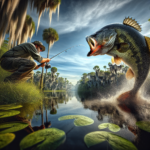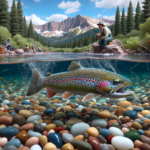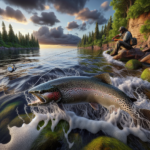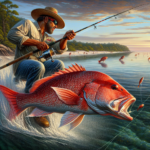Largemouth Bass Fishing in Florida’s Lakes and Rivers

Introduction
Did you know that Florida is home to some of the best largemouth bass fishing in the world? With over 7,500 lakes and countless rivers, the Sunshine State offers unparalleled opportunities for anglers of all skill levels. This article will delve into the intricacies of largemouth bass fishing in Florida’s lakes and rivers, covering everything from the best fishing techniques and gear to top fishing spots and seasonal considerations.
Whether you’re a seasoned angler looking to refine your skills or a novice eager to catch your first bass, understanding the nuances of fishing in Florida’s diverse aquatic ecosystems can make all the difference. This guide aims to provide you with the knowledge and tools you need to make your fishing trips both successful and enjoyable.
Background/Context
Historical or Cultural Significance
Largemouth bass fishing has a rich history in Florida, dating back to the early 20th century when the state began to gain recognition as a premier fishing destination. The largemouth bass, scientifically known as Micropterus salmoides, is not only the state fish of Florida but also a cultural icon. Anglers from around the world flock to Florida’s waters, contributing significantly to the local economy and fostering a community of passionate fishing enthusiasts.
Geographical Overview
Florida’s unique geography, characterized by its warm climate, abundant rainfall, and diverse ecosystems, creates ideal conditions for largemouth bass. The state’s lakes and rivers are teeming with aquatic vegetation, providing ample cover and food sources for bass. Notable water bodies include Lake Okeechobee, the Kissimmee Chain of Lakes, and the St. Johns River, each offering distinct fishing experiences.
Key Points/Details
Fishing Techniques
Technique Overview
Several techniques are effective for largemouth bass fishing in Florida, including:
- Topwater Fishing: Using lures that float on the water’s surface to attract bass.
- Flipping and Pitching: Precise casting techniques to place lures in heavy cover.
- Crankbait Fishing: Using lures that mimic baitfish to provoke strikes.
- Soft Plastics: Versatile lures that can be rigged in various ways to imitate prey.
When and Where to Use
Topwater fishing is most effective during early morning and late evening when bass are actively feeding near the surface. Flipping and pitching are ideal for targeting bass hiding in dense vegetation or under structures. Crankbait fishing works well in open water and along drop-offs, while soft plastics are versatile enough to be used in various conditions.
Recommended Gear
For topwater fishing, a medium-heavy rod with a fast action tip and a high-speed reel are recommended. Flipping and pitching require a heavy rod with a strong backbone and a baitcasting reel. Crankbait fishing is best done with a medium-action rod and a reel with a moderate gear ratio. Soft plastics can be fished with a variety of rod and reel combinations, depending on the rigging method.
Species Information
Species Overview
The largemouth bass is a predatory fish known for its aggressive behavior and strong fight. They prefer habitats with abundant cover, such as submerged vegetation, fallen trees, and man-made structures. Bass are most active during the warmer months but can be caught year-round in Florida’s mild climate.
Best Practices
To successfully catch largemouth bass, consider the following tips:
- Match the Hatch: Use lures that mimic the local prey species.
- Vary Retrieval Speed: Experiment with different retrieval speeds to trigger strikes.
- Fish During Low Light Conditions: Early morning and late evening are prime times for bass fishing.
Location Information
Top Fishing Spots
Some of the best largemouth bass fishing spots in Florida include:
- Lake Okeechobee: Known for its trophy-sized bass and extensive vegetation.
- Kissimmee Chain of Lakes: Offers diverse fishing opportunities with interconnected lakes.
- St. Johns River: A large river system with abundant bass and varied habitats.
- Rodman Reservoir: Famous for its high bass population and scenic beauty.
Regulations and Licenses
Florida requires a freshwater fishing license for anglers aged 16 and older. Regulations include size and bag limits, which vary by location. It’s essential to check the Florida Fish and Wildlife Conservation Commission (FWC) website for the most up-to-date regulations before heading out.
Seasonal Considerations
Seasonal Variations
Fishing conditions in Florida change with the seasons. Spring and fall are peak times for bass fishing, as the fish are more active and feeding aggressively. Summer can be productive, but anglers may need to fish deeper waters or shaded areas to find bass. Winter fishing is slower but still possible, especially in southern Florida.
Best Times to Fish
The best times to fish for largemouth bass in Florida are during the early morning and late evening, regardless of the season. These low-light periods are when bass are most active and likely to strike.
Events and Tournaments
Event Overview
Florida hosts numerous bass fishing tournaments throughout the year, attracting anglers from across the country. Notable events include the Bassmaster Elite Series and the FLW Tour, which often feature stops at Lake Okeechobee and the Kissimmee Chain of Lakes.
Preparation Tips
To prepare for a fishing tournament, consider the following tips:
- Pre-Fish the Area: Spend time scouting the tournament waters to identify productive spots.
- Organize Your Gear: Ensure all your equipment is in good working order and easily accessible.
- Stay Informed: Keep up with weather forecasts and water conditions to adjust your strategy accordingly.
Tips and Best Practices
General Tips
Here are some general tips to enhance your largemouth bass fishing experience in Florida:
- Stay Mobile: Don’t be afraid to move around and try different spots if you’re not getting bites.
- Use Polarized Sunglasses: These can help you see underwater structures and fish more clearly.
- Pay Attention to Water Temperature: Bass are more active in warmer water, so focus on areas with higher temperatures.
Avoid Common Mistakes
Common mistakes to avoid include:
- Overlooking Small Details: Pay attention to subtle changes in water color, temperature, and structure.
- Using the Wrong Gear: Ensure your gear matches the fishing conditions and techniques you’re using.
- Ignoring Local Advice: Local anglers often have valuable insights into the best spots and techniques.
Advanced Techniques
For more experienced anglers, consider these advanced techniques:
- Drop Shotting: A finesse technique that involves suspending a baited hook above a weight.
- Swim Jigs: Using jigs with a swimming action to cover more water and attract active bass.
- Deep Cranking: Using deep-diving crankbaits to target bass in deeper waters.
Gear and Equipment Recommendations
Essential Gear
The essential gear for largemouth bass fishing in Florida includes:
- Rods: Medium-heavy to heavy rods for various techniques.
- Reels: Baitcasting and spinning reels with appropriate gear ratios.
- Lines: Braided and fluorocarbon lines for different conditions.
- Lures: A variety of topwater, crankbaits, soft plastics, and jigs.
Optional Gear/Upgrades
Consider these optional gear upgrades:
- Fish Finder: Helps locate fish and underwater structures.
- Power Poles: Shallow water anchors for stabilizing your boat.
- High-Quality Tackle Box: Keeps your gear organized and easily accessible.
Where to Buy or Rent
You can purchase or rent fishing gear from local shops such as Bass Pro Shops, Dick’s Sporting Goods, and various independent tackle shops. Online retailers like Tackle Warehouse and Amazon also offer a wide selection of fishing equipment.
Safety and Conservation
Safety Tips
Safety should always be a priority when fishing. Consider these tips:
- Wear a Life Jacket: Always wear a life jacket when on a boat.
- Stay Hydrated: Florida’s heat can be intense, so drink plenty of water.
- Be Aware of Wildlife: Watch out for alligators and other wildlife that may pose a threat.
Conservation Practices
Sustainable fishing practices are crucial for preserving Florida’s bass populations. Follow these guidelines:
- Catch and Release: Release larger bass to help maintain healthy populations.
- Respect Regulations: Adhere to size and bag limits set by the FWC.
- Avoid Littering: Dispose of trash and fishing line properly to protect the environment.
Planning Your Trip
Accommodations
Florida offers a range of accommodations near popular fishing spots, from campgrounds and RV parks to hotels and vacation rentals. Consider staying at places like Roland Martin Marina & Resort near Lake Okeechobee or Camp Mack, a Guy Harvey Lodge, near the Kissimmee Chain of Lakes.
Travel Tips
When planning your trip, consider these travel tips:
- Check Road Conditions: Florida’s weather can affect road conditions, so plan your route accordingly.
- Rent a Boat: If you don’t have your own boat, consider renting one from a local marina.
- Pack Accordingly: Bring sunscreen, insect repellent, and appropriate clothing for the weather.
Additional Activities
Florida offers plenty of activities for non-fishing time, including:
- Wildlife Viewing: Visit local wildlife refuges and parks to see native species.
- Water Sports: Enjoy kayaking, paddleboarding, and swimming in Florida’s waters.
- Local Attractions: Explore nearby attractions such as theme parks, museums, and historical sites.
Frequently Asked Questions (FAQs)
Do I need a fishing license to fish for largemouth bass in Florida?
Yes, a freshwater fishing license is required for anglers aged 16 and older. Licenses can be purchased online or at local retailers.
What is the best time of year to fish for largemouth bass in Florida?
Spring and fall are the best times for bass fishing, but you can catch bass year-round in Florida’s mild climate.
What are some effective lures for largemouth bass in Florida?
Effective lures include topwater baits, crankbaits, soft plastics, and jigs. Matching the local prey species can increase your chances of success.
Are there any specific regulations for largemouth bass fishing in Florida?
Yes, regulations include size and bag limits, which vary by location. Check the FWC website for the most up-to-date information.
Conclusion
Largemouth bass fishing in Florida’s lakes and rivers offers an exciting and rewarding experience for anglers of all levels. By understanding the best techniques, gear, and locations, you can maximize your chances of success. Remember to follow safety guidelines and conservation practices to ensure a sustainable and enjoyable fishing experience for years to come. So grab your gear, head to one of Florida’s premier fishing spots, and get ready to reel in some trophy-sized bass!




